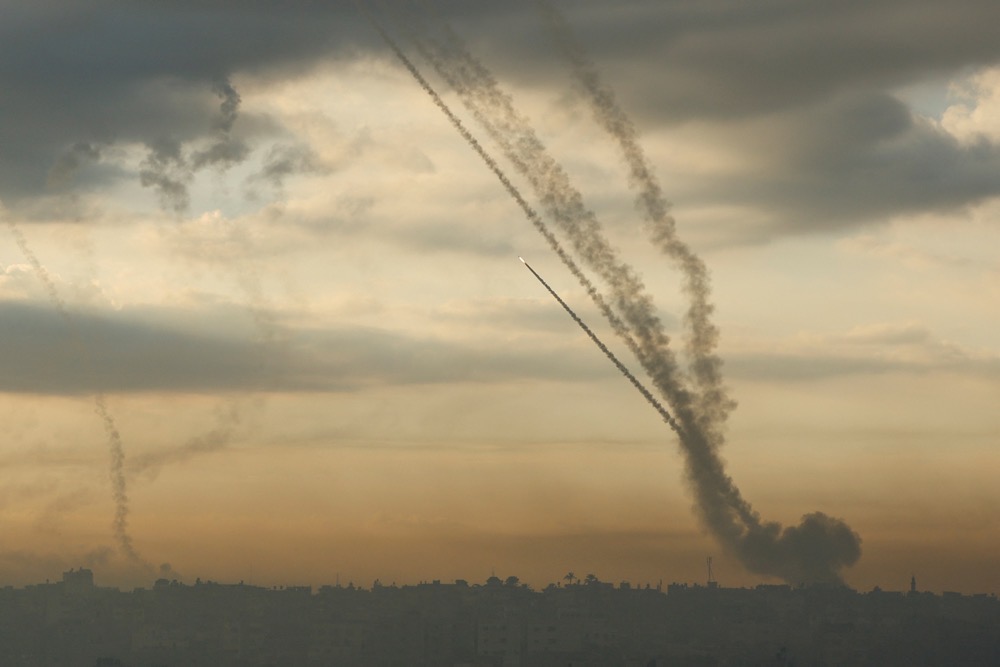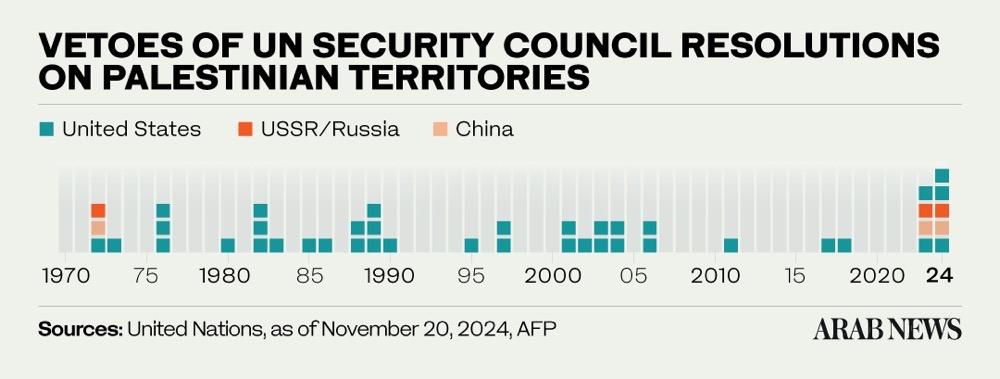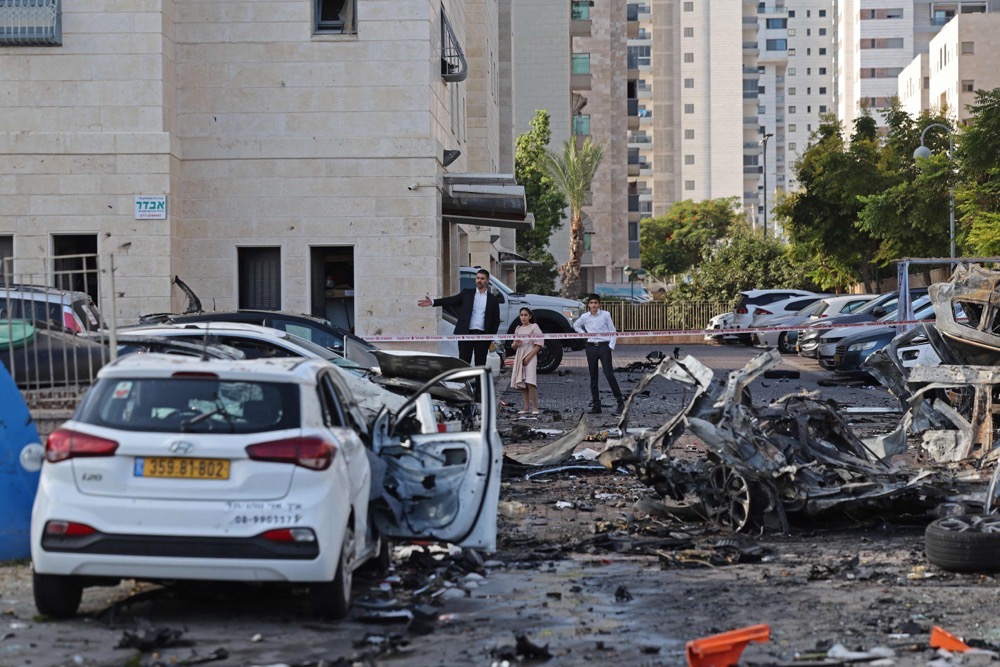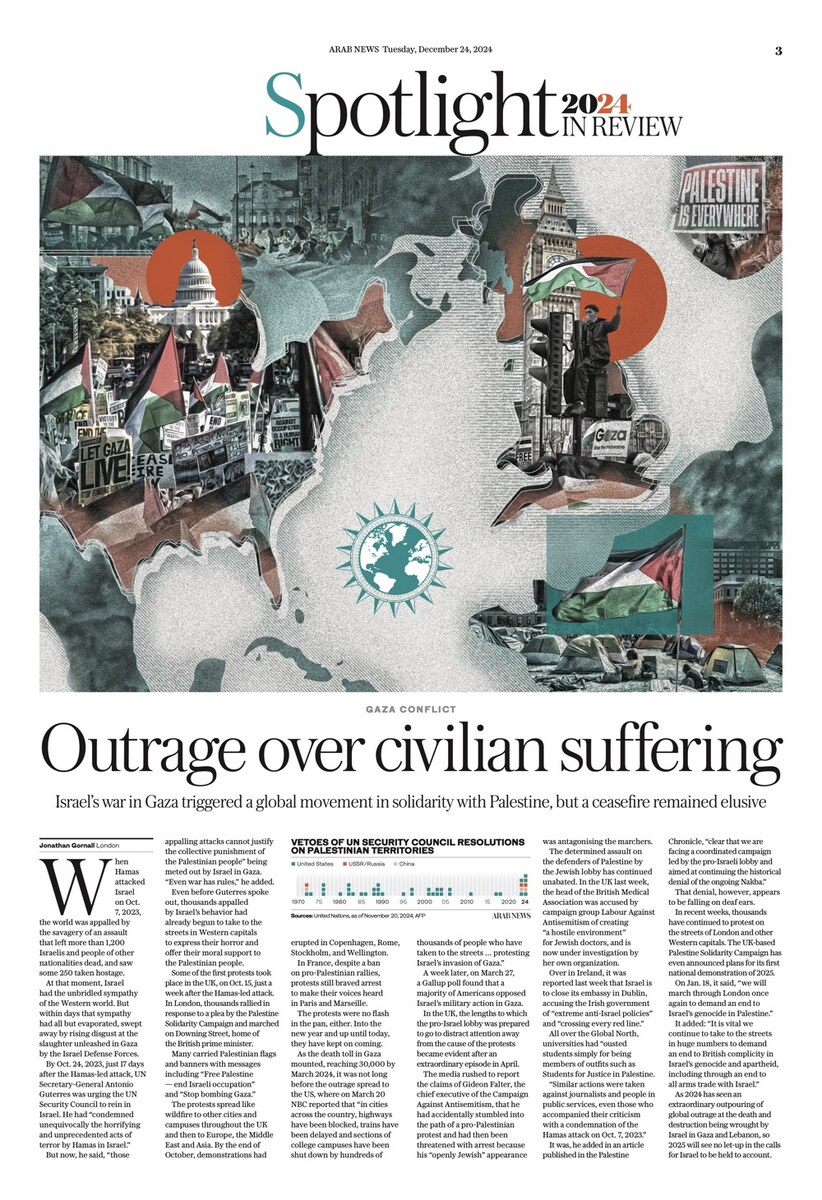LONDON: When Hamas attacked Israel on Oct. 7, 2023, the world was appalled by the savagery of an assault that left more than 1,200 Israelis and people of other nationalities dead, and saw some 250 taken hostage.
At that moment, Israel had the unbridled sympathy of the Western world. But within days that sympathy had all but evaporated, swept away by rising disgust at the slaughter unleashed in Gaza by the Israel Defense Forces.
By Oct. 24, 2023, just 17 days after the Hamas-led attack, UN Secretary-General Antonio Guterres was urging the UN Security Council to rein in Israel. He had “condemned unequivocally the horrifying and unprecedented acts of terror by Hamas in Israel.”
But now, he said, “those appalling attacks cannot justify the collective punishment of the Palestinian people” being meted out by Israel in Gaza. “Even war has rules,” he added.

Thousands of people gather outside the White House during the National March on Washington for Palestine. (Getty Images/AFP/File)
By then, more than a million Palestinians had already been displaced and 5,000 had been killed, according to Gaza’s health authorities, including more than 1,100 women and 2,000 children, along with journalists, medics, and first responders.
Even before Guterres spoke out, thousands appalled by Israel’s behavior had already begun to take to the streets in Western capitals to express their horror and offer their moral support to the Palestinian people.
Some of the first protests took place in the UK, on Oct. 15, just a week after the Hamas-led attack. In London, thousands rallied in response to a plea by the Palestine Solidarity Campaign and marched on Downing Street, home of the British prime minister.
Many carried Palestinian flags and banners with messages including “Free Palestine — end Israeli occupation” and “Stop bombing Gaza.”
The BBC’s headquarters in Portland Place, central London, was daubed in red paint, symbolising what activists called the broadcaster’s “complicity in Israel’s genocide of the Palestinian people through biased reporting.”
In Parliament and in some sections of the media, the protestors were immediately accused of antisemitism and of supporting Hamas. One protestor, interviewed in London by Reuters, made the purpose of the protests crystal clear.

Rockets are fired by Palestinian militants into Israel, in Gaza October 7, 2023. (Reuters/File)
“This is not about Hamas,” she said. “This is about protecting Palestinian lives.”
The protests spread like wildfire to other cities and campuses throughout the UK and then to Europe, the Middle East and Asia. By the end of October, demonstrations had erupted in Copenhagen, Rome, Stockholm, and Wellington.
In France, despite a ban on pro-Palestinian rallies, protests still braved arrest to make their voices heard in Paris and Marseille.
The protests were no flash in the pan, either. Into the new year and up until today, they have kept on coming.

As the death toll in Gaza mounted, reaching 30,000 by March 2024, it was not long before the outrage spread to the US, where on March 20 NBC reported that “in cities across the country, highways have been blocked, trains have been delayed and sections of college campuses have been shut down by hundreds of thousands of people who have taken to the streets … protesting Israel’s invasion of Gaza.”
A week later, on March 27, a Gallup poll found that a majority of Americans opposed Israel’s military action in Gaza.

Residents walk past burnt-out vehicles in Ashkelon following a rocket attack from the Gaza Strip into Israel on October 7, 2023. (AFP)
During a speech on the election campaign trail in North Carolina, President Joe Biden was interrupted by protesters demanding a US intervention to end the suffering of the Palestinians. Their shouts turned to cheers when the president heard them out and then said: “They have a point. We need to get a lot more care into Gaza.”
Dismay at the administration’s failure to rein in Israel, especially among the influential Arab American community in some key swing states, may well have cost Biden’s VP Kamala Harris the presidency.
Everywhere, alarmed by the strength of global feeling provoked by the suffering of Palestinians in Gaza, the pro-Israel lobby rallied. Unable to defend Israel’s actions in Gaza, instead it went on the attack.
The protests, they said, were not pro-Palestinian or even anti-Israel, but antisemitic — an allegation that is frequently leveled at anyone who has criticised Israel’s behavior in Gaza and the West Bank.
In the UK, the lengths to which the pro-Israel lobby was prepared to go to distract attention away from the cause of the protests became evident after an extraordinary episode in April.

A man carries a wounded child into at al-Shifa hospital in Gaza City on October 10, 2023. (AFP/File)
The media rushed to report the claims of Gideon Falter, the chief executive of the Campaign Against Antisemitism, that he had accidentally stumbled into the path of a pro-Palestinian protest and had then been threatened with arrest because his “openly Jewish” appearance was antagonising the marchers.
The incident was filmed, and selectively edited, by the CAA. But when the full footage later emerged it became clear that Falter had deliberately tried to provoke demonstrators by pushing past police officers and walking in the path of the demonstration.
In the US, wealthy Jewish donors banded together to attack universities for allowing pro-Palestinian protests on their campuses. According to a report by CNBC, even as protests were taking off in the US in late October 2023, billionaire supporters of Ivy League schools including Harvard, Yale, and Penn threatened to withdraw funding.

Pro-Palestinian protesters stand with a large banner in during a demonstration for Palestine in central London. (AFP)
By January 2024, the wealthy donors had successfully hounded out of office two high-profile leaders, Harvard president Claudine Gay and Penn president Liz Magill, both of whom resigned.
In an op-ed published in the Guardian in January 2024, Robert Reich, a former US secretary of labor, wrote that “as a Jew, I also cannot help but worry that the actions of these donors — many of them Jewish, many from Wall Street — could fuel the very antisemitism they claim to oppose, based on the age-old stereotype of wealthy Jewish bankers controlling the world.”

An Israeli army soldier raises a fist while deploying along the border with the Gaza Strip on October 13, 2023. (AFP)
The determined assault on the defenders of Palestine by the Jewish lobby has continued unabated. In the UK last week, the head of the British Medical Association was accused by campaign group Labour Against Antisemitism of creating “a hostile environment” for Jewish doctors, and is now under investigation by her own organization.
Dr. Mary McCarthy’s “offense” was to have reposted a message on her X account that described the conflict in Gaza as “a holocaust.”
Over in Ireland, it was reported last week that Israel is to close its embassy in Dublin, accusing the Irish government of “extreme anti-Israel policies” and “crossing every red line.” In May, Ireland, followed quickly by Spain, Norway, and Slovenia, had recognized Palestine as an independent, sovereign state.
In July, the Israeli historian Ilan Pappe wrote of his alarm that “nine months into the Israeli genocidal assault on the Gaza Strip,” Israel’s “parallel attack on freedom of speech on Palestine is continuing with intensity, making it difficult for the general public to appreciate the reality in Palestine beyond the manipulated and distorted coverage offered by mainstream media.”

Columbia University students set up a pro-Palestinian encampment on their campus in New York City. (AFP)
All over the Global North, universities had “ousted students simply for being members of outfits such as Students for Justice in Palestine. They even disinvited academics or authors who dared to criticize Israel.
“Similar actions were taken against journalists and people in public services, even those who accompanied their criticism with a condemnation of the Hamas attack on Oct. 7, 2023.”
It was, he added in an article published in the Palestine Chronicle, “clear that we are facing a coordinated campaign led by the pro-Israeli lobby and aimed at continuing the historical denial of the ongoing Nakba.”
That denial, however, appears to be falling on deaf ears.
In recent weeks, thousands have continued to protest on the streets of London and other Western capitals. The UK-based Palestine Solidarity Campaign has even announced plans for its first national demonstration of 2025.
On Jan. 18, it said, “we will march through London once again to demand an end to Israel’s genocide in Palestine.”

“Even war has rules”: UN Secretary-General Antonio Guterres on Oct. 24, 2023. (AP/File)
It added: “It is vital we continue to take to the streets in huge numbers to demand an end to British complicity in Israel’s genocide and apartheid, including through an end to all arms trade with Israel.”
As 2024 has seen an extraordinary outpouring of global outrage at the death and destruction being wrought by Israel in Gaza and Lebanon, so 2025 will see no let-up in the calls for Israel to be held to account.






























